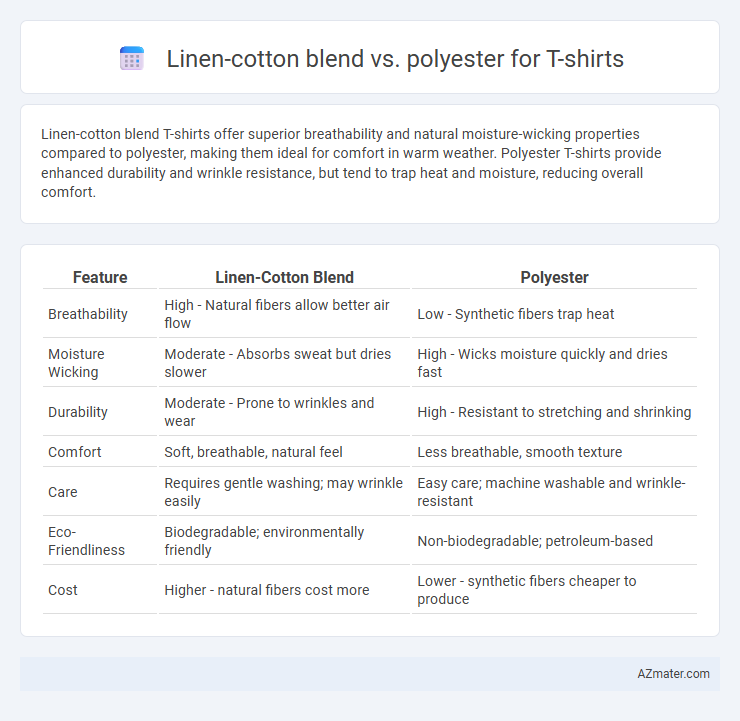Linen-cotton blend T-shirts offer superior breathability and natural moisture-wicking properties compared to polyester, making them ideal for comfort in warm weather. Polyester T-shirts provide enhanced durability and wrinkle resistance, but tend to trap heat and moisture, reducing overall comfort.
Table of Comparison
| Feature | Linen-Cotton Blend | Polyester |
|---|---|---|
| Breathability | High - Natural fibers allow better air flow | Low - Synthetic fibers trap heat |
| Moisture Wicking | Moderate - Absorbs sweat but dries slower | High - Wicks moisture quickly and dries fast |
| Durability | Moderate - Prone to wrinkles and wear | High - Resistant to stretching and shrinking |
| Comfort | Soft, breathable, natural feel | Less breathable, smooth texture |
| Care | Requires gentle washing; may wrinkle easily | Easy care; machine washable and wrinkle-resistant |
| Eco-Friendliness | Biodegradable; environmentally friendly | Non-biodegradable; petroleum-based |
| Cost | Higher - natural fibers cost more | Lower - synthetic fibers cheaper to produce |
Introduction: Linen-Cotton Blend vs Polyester T-Shirts
Linen-cotton blend T-shirts offer superior breathability and moisture-wicking properties, making them ideal for hot weather and active wear. Polyester T-shirts provide better durability and wrinkle resistance, with enhanced color retention for long-lasting vibrancy. Choosing between linen-cotton blend and polyester depends on the desired balance of comfort, performance, and maintenance.
Fabric Composition and Structure
Linen-cotton blend T-shirts combine natural flax fibers with soft cotton, resulting in a breathable, lightweight fabric with excellent moisture-wicking properties and a slightly textured surface that enhances comfort and durability. Polyester T-shirts consist of synthetic fibers derived from petroleum, offering a smooth, resilient fabric structure that resists wrinkles, shrinks minimally, and provides high tensile strength, making it ideal for athletic wear. The linen-cotton blend promotes better air circulation and natural temperature regulation, while polyester excels in moisture durability and quick-drying capabilities due to its hydrophobic fiber structure.
Comfort and Breathability Comparison
Linen-cotton blend T-shirts offer superior breathability and moisture-wicking properties, making them ideal for hot and humid conditions due to natural fibers that enhance airflow and reduce sweat retention. Polyester T-shirts, while durable and moisture-resistant, tend to trap heat and can cause discomfort during extended wear, as their synthetic fibers lack natural ventilation. Choosing linen-cotton blends ensures increased comfort through temperature regulation and softness, outperforming polyester in breathability for everyday wear.
Moisture-Wicking and Quick-Dry Capabilities
Linen-cotton blend T-shirts offer excellent moisture-wicking properties due to natural fibers that absorb sweat and allow air circulation, enhancing breathability. Polyester T-shirts excel in quick-dry capabilities with synthetic fibers designed to wick moisture away from the skin and evaporate it rapidly, making them ideal for active wear. Choosing between linen-cotton blend and polyester depends on the balance between natural comfort and synthetic performance desired in moisture management.
Durability and Longevity
Linen-cotton blend T-shirts offer moderate durability with natural fibers that breathe well but may weaken over time due to frequent washing. Polyester T-shirts excel in longevity, resisting stretching, shrinking, and abrasion, making them highly durable for extended wear. Choosing polyester ensures a longer lifespan, while linen-cotton blends provide comfort with moderate durability.
Eco-Friendliness and Sustainability
Linen-cotton blend T-shirts offer superior eco-friendliness compared to polyester due to their natural, biodegradable fibers that have a lower environmental impact during production. These blends require less water and energy, significantly reducing carbon emissions and pesticide use relative to synthetic polyester fabrics derived from petroleum. While polyester excels in durability, its non-biodegradable nature contributes to microplastic pollution, making linen-cotton blends a more sustainable and environmentally responsible choice for eco-conscious consumers.
Aesthetic Appeal and Texture
A linen-cotton blend T-shirt offers a natural, breathable fabric with a textured, slightly crisp feel that softens over time, creating a sophisticated and casual aesthetic. Polyester T-shirts typically have a smoother, synthetic texture with a consistent finish and vibrant color retention but can lack the organic, breathable quality of natural fibers. The linen-cotton blend stands out for its unique surface irregularities and matte finish, enhancing a refined, vintage-inspired look compared to the sleek and sometimes shiny appearance of polyester.
Maintenance and Care Requirements
Linen-cotton blend T-shirts require gentle washing with cold water and air drying to prevent shrinkage and maintain fabric softness, while avoiding bleach to preserve fiber integrity. Polyester T-shirts are low-maintenance, allowing machine washing in warm water and tumble drying without significant risk of damage or fading. Proper care techniques extend the lifespan of both fabrics, but polyester's durability demands less specialized attention compared to the delicate linen-cotton blend.
Cost Analysis: Affordability and Value
Linen-cotton blend T-shirts typically have a higher upfront cost compared to polyester due to the natural fibers and more complex manufacturing process. Polyester offers greater affordability and durability, making it a cost-effective option for bulk purchases or long-term use. However, linen-cotton blends provide better breathability and comfort, which adds value despite the higher price point, especially in warm climates.
Best Uses: Choosing the Right Fabric for Your Lifestyle
Linen-cotton blends excel in breathability and moisture-wicking, making them ideal for warm weather and active lifestyles where comfort and natural fibers are priorities. Polyester offers superior durability, wrinkle resistance, and quick-drying properties, suited for athletic wear and travel-friendly garments. Selecting between these fabrics depends on your daily activities, climate exposure, and preference for natural softness versus synthetic performance.

Infographic: Linen-cotton blend vs Polyester for T-shirt
 azmater.com
azmater.com